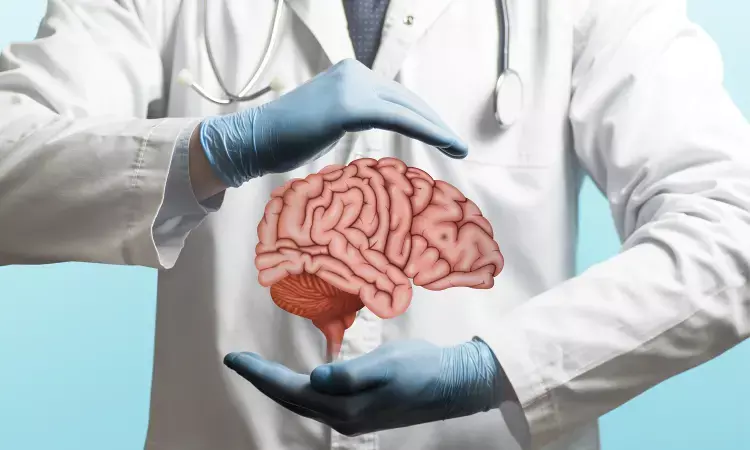- Home
- Medical news & Guidelines
- Anesthesiology
- Cardiology and CTVS
- Critical Care
- Dentistry
- Dermatology
- Diabetes and Endocrinology
- ENT
- Gastroenterology
- Medicine
- Nephrology
- Neurology
- Obstretics-Gynaecology
- Oncology
- Ophthalmology
- Orthopaedics
- Pediatrics-Neonatology
- Psychiatry
- Pulmonology
- Radiology
- Surgery
- Urology
- Laboratory Medicine
- Diet
- Nursing
- Paramedical
- Physiotherapy
- Health news
- Fact Check
- Bone Health Fact Check
- Brain Health Fact Check
- Cancer Related Fact Check
- Child Care Fact Check
- Dental and oral health fact check
- Diabetes and metabolic health fact check
- Diet and Nutrition Fact Check
- Eye and ENT Care Fact Check
- Fitness fact check
- Gut health fact check
- Heart health fact check
- Kidney health fact check
- Medical education fact check
- Men's health fact check
- Respiratory fact check
- Skin and hair care fact check
- Vaccine and Immunization fact check
- Women's health fact check
- AYUSH
- State News
- Andaman and Nicobar Islands
- Andhra Pradesh
- Arunachal Pradesh
- Assam
- Bihar
- Chandigarh
- Chattisgarh
- Dadra and Nagar Haveli
- Daman and Diu
- Delhi
- Goa
- Gujarat
- Haryana
- Himachal Pradesh
- Jammu & Kashmir
- Jharkhand
- Karnataka
- Kerala
- Ladakh
- Lakshadweep
- Madhya Pradesh
- Maharashtra
- Manipur
- Meghalaya
- Mizoram
- Nagaland
- Odisha
- Puducherry
- Punjab
- Rajasthan
- Sikkim
- Tamil Nadu
- Telangana
- Tripura
- Uttar Pradesh
- Uttrakhand
- West Bengal
- Medical Education
- Industry
Exercise may prevent Dementia by keeping BMI and insulin levels low

MINNEAPOLIS: Studies have shown that exercise helps protect brain cells. A new study looking at the mechanisms involved in this relationship suggests that the role exercise plays in maintaining insulin and body mass index levels may help protect brain volume and thus help stave off dementia. The research is published in the April 13, 2022, online issue of Neurology, the medical journal of the American Academy of Neurology.
"These results may help us to understand how physical activity affects brain health, which may guide us in developing strategies to prevent or delay age-related decline in memory and thinking skills," said study author Géraldine Poisnel, PhD, of Inserm Research Center in Caen, France. "Older adults who are physically active gain cardiovascular benefits, which may result in greater structural brain integrity."
In contrast, researchers found that the relationship between exercise and the metabolism of glucose in the brain was not affected by insulin or body mass index (BMI) levels. Reduced glucose metabolism in the brain can been seen in people with dementia.
The study involved 134 people with an average age of 69 who had no memory problems. The people filled out surveys about their physical activity over the past year. They had brain scans to measure volume and glucose metabolism. Information was gathered on BMI and insulin levels as well as cholesterol, blood pressure and other factors.
People with the most physical activity had a higher total volume of grey matter in their brains than people with the least amount of physical activity, with an average of about 550,000 cubic millimeters (mm³) compared to about 540,000 mm³. When researchers looked only at areas of the brain affected by Alzheimer's disease, they found the same results.
Those with the most activity also had a higher average rate of glucose metabolism in the brain than those with the least amount of activity.
Higher physical activity was not associated with how much amyloid plaque people had in their brains. Amyloid plaque is a marker for Alzheimer's disease.
Poisnel said more research is needed to understand the mechanisms behind these relationships. "Maintaining a lower BMI through physical activity could help prevent disturbed insulin metabolism that is often seen in aging, thus promoting brain health," Poisnel said.
Dr Kamal Kant Kohli-MBBS, DTCD- a chest specialist with more than 30 years of practice and a flair for writing clinical articles, Dr Kamal Kant Kohli joined Medical Dialogues as a Chief Editor of Medical News. Besides writing articles, as an editor, he proofreads and verifies all the medical content published on Medical Dialogues including those coming from journals, studies,medical conferences,guidelines etc. Email: drkohli@medicaldialogues.in. Contact no. 011-43720751


